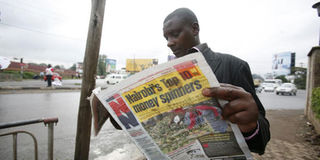‘Make available’ and ‘avail’ have different meaning

A man reads the 'Nairobi News'. PHOTO
What you need to know:
To be quite sure, the verb to avail and the verbal phrase to make available are both legitimate.
Because the duty subeditor at The Standard was unaware of the difference between to avail and to make available, he or she used them absolutely interchangeably, an embarrassing mistake that occurs almost daily in the pages of Kenya’s English-language press.
It took long years of struggle to make Kenya’s newspapers use the adjective available correctly. Kudos, then, to The Standard subeditor who finally wrote as follows in a page-one headline on March 14: “Why State will make available HIV drugs for the healthy”.
What most subeditors would have written is: “Why State will avail HIV drugs for the healthy”. But please take great care. I might have arranged my words slightly differently to make them even more forceful. To be quite sure, the verb to avail and the verbal phrase to make available are both legitimate.
However, they do not mean the same thing. Because the duty subeditor was unaware of the difference between to avail and to make available, he or she used them absolutely interchangeably, an embarrassing mistake that occurs almost daily in the pages of Kenya’s English-language press.
However, the important thing is that the reporter and the subeditor have used the verb to make available, rather than the ver bto avail, which – although even more common in the pages of Kenya’s newspapers – has at least a nuance of semantic difference.
The verb that I usually get from the pages of Nairobi’s English-language daily newspapers is “to avail” – rather than “to make available”. Yet, in context, the semantic difference between to avail and to make available is as wide as Cancer is from Capricorn.
MAKE ACCESSIBLE
To avail is to do something active. It is to make something accessible. To be merely available, however, is to be very passive. Goods merely existing in a shop will not be truly available until the shop owner opens the shop and, even then, only when the shop is visited by possible buyers.
As the great English poet William Wordsworth points out, human life does not consist merely in existence. Mere existence is something we share with even amoeba and protista. In the human context, to be alive is to think and to act creatively. To be alive is to participate consciously and actively in the bettering of your natural and social environment.
But here, in East Africa alone – especially in Kenya – we know from their own utterances and other activities that many human beings, especially in politics, merely exist but are not really alive. For human beings – as William Wordsworth scoffs in poetry – mere existence is not really life.
If it were, we would be constrained to say that Kit Mikayi and Kiima Kimwe are alive (which, at least poetically, they really are). In other words, a human being’s life demands much more than mere existence. A person must also be of some existential advantage to his or her whole socio-human neighbourhood in order for his or her presence to be seen as socially meaningful.
Physically and mentally, one must be able to get hold and take advantage of the thing. In order for the thing’s existence to be of social significance to you as a human being, you must be able, on society’s behalf, to avail yourself of the thing.





